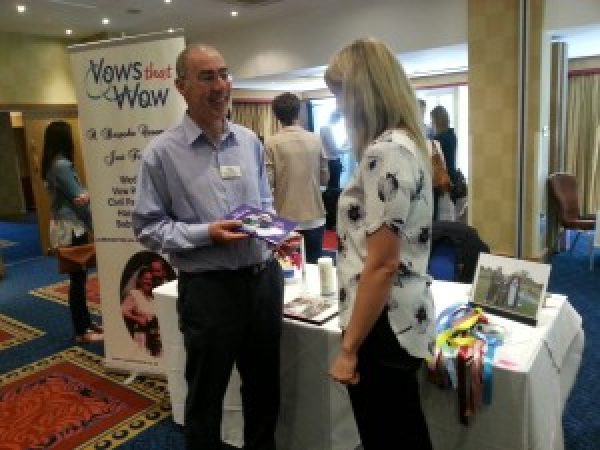
by Michael | Sep 26, 2017 | Blog
Attending your first wedding fair can be pretty daunting.
What do you want to find out? Who do you need to speak to? How are you going to avoid all those stall-holders vying for your attention? What are you expecting to get out of the visit?
National or local fair?
Each wedding fair is different. You may choose to go to a huge national event (such as the National Wedding Show), where everything is on a vast scale. It will be noisy, busy, pressurised and demanding; however, you can expect every sort of supplier there, so you may possibly be able to resolve all your concerns on the spot.
Alternatively, you can attend smaller wedding fairs. They are usually organised by a wedding planner or else by the venue, often a hotel licensed for weddings. Attendance will vary, but, unlike thousands for a national fair, hundreds – or just a hundred, or even fifty– visitors will typically pass through in the day.
There may – or may not – be a bridal fashion parade as part of the event. If you choose well, you may get offered a drink and canapés on the house, which is always nice. There’s normally a ‘goody bag’ too.
By the way, the same wedding fair will not be the same this time as it was last time around. Weather, different stall-holders, punters – anything – may affect the atmosphere.
A national show will offer a vast array of photographers, cake-makers, florists etc. to choose from; however, you can expect a (much smaller) choice of suppliers at the local wedding fairs. Sometimes, these are vetted by the host venue, but not necessarily.
At a national event, where they will be crowds, you may not be given the time to ask the questions you want addressed. (Of course, you can take a card and contact the supplier later.) At a local event, you should get the chance to have a reasonably undisturbed chat with the stall-holder.
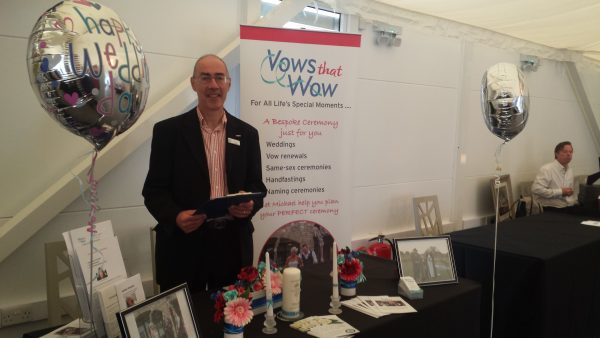
How do I make the most of a fair?
Your expectations will depend on your reasons for attending a show. In other words, if you’ve just got engaged and this is your first fair, you’re probably looking for ideas only at this stage. A more seasoned visitor may be targeting certain suppliers, and can be pretty precise about what he/she needs to find out.
Either way, don’t be bamboozled, especially when you arrive. You may find that the room or rooms are large, animated, possibly with flashing lights etc. and music playing. The room is meant to be a feast for the senses – and the number and variety of stall-holders adds to it. Imagine a middle-eastern bazaar, and you’ll get the picture.
If you can come prepared (even with notes) as to what you want and need, you can make the most of the fair. Suppliers will try and entice you to stop at their stall (either by engaging you in conversation or by offering a freebie). Don’t do what some people do, which is refuse to make eye contact and sneak through without talking to anybody. You don’t know what you might be missing.
The supplier is not going to be nasty to you – or force you into parting with money. Moreover, you may learn something of potential significance to you. They are professionals, after all, and helping you is likely to be in their interests!
In my experience, people have rarely considered a civil celebrant like myself until we chat, and many will get excited about the unexpected extra dimension that is available to them.
Of course, you can come to a wedding fair to enjoy yourself – they’re usually a great show, with fabulous displays – but the best thing is to come with an open mind. Engage with the stall-holders. Have a cheery chat. Make notes or take photos, if you want to remember certain things. If you’re not interested, politely move on. You won’t upset the supplier: he/she does not expect every encounter to represent business!
The aftermath
You’ll receive a load of flyers and stuff in the goody bag. A good idea is to go through this when you get home (before you forget everything that was said to you!) and eliminate what you’re sure is irrelevant. (Do this at least before visiting your next fair!)
If there’s anything that stood out positively, don’t leave it long before contacting the supplier. They may get booked up, of course, but bear in mind that, as time goes by, you are likely to forget what attracted you in the first place.
So go to a fair in a positive mindset. Nobody will be expecting you to buy on the spot (although this may actually happen). Just go, enjoy, chat and listen. Have an open mind. You never know what pearls you may emerge with!
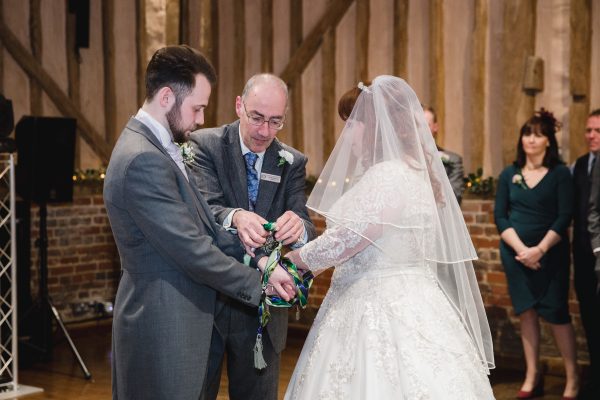
by Michael | Sep 19, 2017 | Blog
Wedding shackles? Sounds a bit melodramatic!
Let’s have a look.
It’s over forty years since people were given free choice as to the type of wedding ceremony they could have. That happened in Australia. It took much longer to get established over here, but England too now gives you the opportunity to have the ceremony that you actually want.
However, judging by my experience at wedding fairs, the majority of people think that the only choices are a full religious service (from a prayer book) or a (secular) register office ceremony. They seem quite surprised when I tell them that the service can be personalised and as religious (or not) as they want.

Putting ON the shackles!!
Source: louiedonovanphotography.co.uk
So, in case you’re a bit confused too, here are some guidelines.
What you MUST do
The bottom line is that, in order to marry legally in England, the marriage has to be registered with the registrars and certain words pronounced aloud. You can only do this at the Register Office, or at a licensed venue (if the registrars can come out there), or in a C. of E. Church.
What you CAN do
You may be thinking about a personalised service. So this won’t be one that, as you move down the ‘conveyor belt’, is the same for you as it is for the next person, and the one after that.
The way you can achieve a unique ceremony is to use a civil celebrant (like myself!). Ensure the mandatory stuff is complete like this:
- Hold your ceremony in a venue licensed for weddings, such as certain hotels. The registrars normally come out (at a price) and will conduct their standard service. As soon as they have done so, your civil celebrant can stand up and start leading the ceremony of your dreams.
- Go along with two witnesses (in your jeans, if you wish!) to the local Register Office. (Book up first!) Once you are legally married, you can proceed (either immediately or even in a day or two) to the venue of your choice where your Civil Celebrant can conduct your special ceremony.
One advantage of number two is that you can go (almost literally) anywhere to hold yourceremony. That might mean an island, a mountain top, a monument, beside the water – you are only limited by your imagination, practicality and permission!
Types of Ceremony
The beauty of a civil celebrant is that you are not obliged to hold a fully non-religious ceremony. Nor is the opposite the case. You may want a compromise. Perhaps you are a mixed-faith couple, unable to marry in your own religious buildings, but who still want a religious service. The civil celebrant can write such a ceremony. Perhaps your parents want religious elements, but you do not. Again, the civil celebrant can help.
However, you want your ceremony, your civil celebrant can advise and guide you.
That way you have abundant choice, and your ceremony will be everything that you want it to be.
And why shouldn’t it be?!
Featured image source: thegroomsays. blogspot.com

by Michael | Sep 12, 2017 | Blog
Destination weddings sound fairy-tale, and tend to be fabulous. Most of us can only dream of one. They are mostly for the very rich only.
Actually, the “average” ceremony may have the same elements as a foreign one, but will probably be less ambitious and cost a lot less.
However, one thing that unites a more modest and a destination wedding is the ceremony. Whether religious, part-religious or secular, somebody will have to be hired to officiate.
I was lucky enough to be the civil celebrant at a Cyprus wedding a couple of weeks ago.
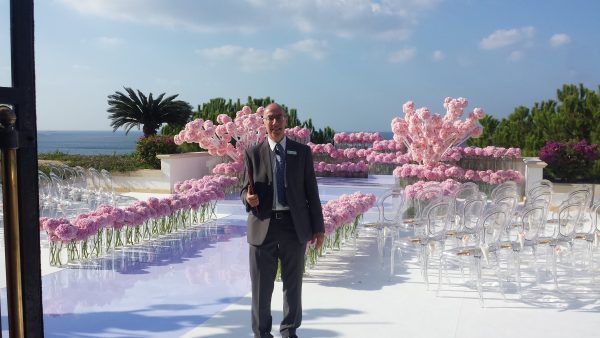
So how was that wedding different from the ones I usually tend to be associated with?
Same old, same old …?
In terms of preparing the ceremony, I worked with the couple as I normally would. We had a preliminary meeting, and I found out what sort of ceremony they were looking for and we exchanged ideas. Some of these would gradually be refined, but now we had the skeleton to start the process off.
Over the months, we exchanged some calls and texts, but the main business was an exchange of e-mails making amendments to the initial draft. We settled on a final text (well, almost “final”!) in good time.
Partly because of rehearsal time, we kept in more frequent touch in the last month.
On the day, I arrived an hour before the start time. I made contact with the relevant people (eg event planner, groom, etc.), a microphone was strapped on to me. Otherwise, it was just waiting around until the “off”. One unusual requirement was for me to read some Russian. Otherwise, the actual ceremony, though beautiful, was not really out of the ordinary.

(No photos of the ceremony because I had to sign a confidentiality agreement!)
Differences
The ceremony stood out, however, because of the setting and the astonishing floral decoration. Moreover, the entire 5-star hotel had been taken over by the wedding party, so eating, drinking, the ceremony and canapés, and the entertainment all took place in different parts of the beautiful hotel.

Hotel Anassa
Obviously, the fact that I was flown out, fed and accommodated for a couple of days was different from conducting a wedding in Harrow. (I didn’t stay at the 5-star hotel, tragically – though I was given a studio in a 3-star hotel, which, I confess, was more than acceptable!)
So why a “destination wedding”?
Is it worth paying a vast amount, when a destination wedding (in most cases) gets you the same basic elements as many an “ordinary” wedding will offer? You end up with a similar ceremony, maybe canapés, a meal and drinks, flowers, caterers, entertainers, etc.
However, the extra cash should provide peace of mind (with a professional wedding planner to do the big tasks and also look after hiccups) and quality – whether of venue, food, supplier or whatever. And this will make a difference.
My own small experience of destination weddings has left me more than willing to head out and conduct more!

by Michael | Aug 31, 2017 | Blog
As a civil celebrant, I am something of a luddite. I don’t really ‘do’ technology.
However, I admit to using scheduling. Thanks to this miracle, this post has been written a few days ago and is being published automatically. I needed to do this because today (‘today’ in the future, not in the present, you understand!) I am flying to Cyprus.
Regrettably, it is not for a holiday, although, if I get the opportunity to enjoy myself, I shall be prepared to do so. Rather, it is to work.
I am being flown over to conduct a wedding in a five star hotel tomorrow.
What could be better?
Here is a glimpse of paradise that awaits:

Not all sunshine, seaside and swimming
I have some reservations, though.
As I write, I am having to fit in quite a lot of work that needs to be done by the time I get back, and that, frankly, is putting me under a fair bit of pressure.
I have never been to Cyprus, so am dependent on others for actually finding the venue in good time.
It is an open-air site (overlooking the shore!), but I burn readily, so am concerned about the sun and heat.
I am being paid to work for one day, but (and this is my fault for not thinking it through) I am going to miss two days’ potential work, as I’ll be spending them travelling to and from the island.
I shall miss my family, although it is for three days only (and there are such things as e-mails and texts, even in Cyprus! I may be a luddite, but I can usually manage those!).
I am being taken slomewhat out of my comfort zone with this.
Poor thing!
In case you are feeling too sorry for me, I have to point out the following:
I have been selected and paid to go on a trip to what looks to be a fabulous destination.
To go out of my comfort zone means that I shall be challenging myself, and there’s nothing like challenge to aid self-development.
I shall be part of two families’ big, big day, and feel very privileged. I hope to add a dash of sparkle to them and all their guests, and make their day unforgettable.
On a practical level, I am bringing a panama hat, so can protect myself from the sun!
On a business level, I hope to impress and gain referrals.
When all’s said and done, I realise that I have a lot more to gain than to lose.
So I’m just going to have to put up with being part of a high society wedding in a 5-star hotel in a superb location. (Well, someone has to do it!)
It’s nice that there are some perks to the (not always glamorous) job of being a civil celebrant!
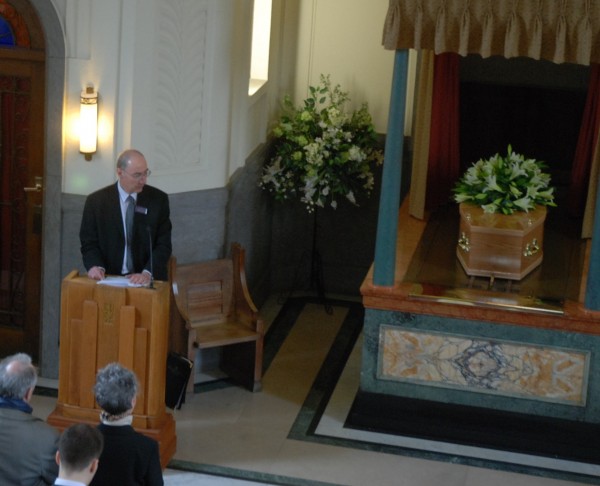
by Michael | Aug 29, 2017 | Blog
You don’t expect things to go wrong at a funeral, do you? After all, everybody goes to great lengths to ensure that things go smoothly. Funeral Directors put themselves out to ensure that needs are met. The staff they use (celebrants, crematorium staff, etc.) are professional, dedicated people.
So you have every right to expect a fitting funeral service.
And, to be fair, you usually get one.
But crematoria have machinery. And, even more significantly, funerals involve human beings. With the best will in the world, things that involve such variables can go wrong.
Sorting out a difficult situation
Last Sunday, I was booked to conduct a funeral at Golders Green Crematorium. As is my custom, I arrived about an hour early. I soon received a phone call from the Funeral Director. The power supply at the Crematorium had been cut. They could supply no music and the coffin would not be able to pass into the cremator.
Somehow, at such short notice, a switch was arranged. The venue became St Marylebone, East Finchley, a few miles away. Two Golders Green staff transferred across, as the ‘home team’ doesn’t work on Sundays. One staff member would operate the cremator at the end of the service and the other would assist with the music and getting people in and out of the chapel.
When we arrived, someone realised that flowers had originally been sent to Golders Green, and were still there! The only way to retrieve them was for the chapel assistant to start the music, shoot back to Golders Green, collect the flowers and return in time for the final piece of music about half an hour later!
It didn’t quite work! Traffic! Luckily, the Funeral Director had been briefed and was able to play the music at the end (and the assistant arrived with the flowers only a few minutes later).
Most people had no idea what had been going on behind the scenes!

A glaring blunder
Sometimes people can’t help but notice that something has gone wrong!
A little bizarrely, a family had asked for us to include a rather unusual and quite difficult hymn that they didn’t themselves know. There would be an organist, but then hymn was so unfamiliar that I felt I couldn’t lead it. Moreover, most of the guests wouldn’t know it and be able to join in. Potentially embarrassing.
So it was decided to play a CD of the hymn, and we might be able to join in with that.
On the day, I went through the service in advance with the crematorium assistant, so that he’d know what music to play, and when. He’s been working there 25 years now, and really knows his stuff, so I had no concerns there.
When it came to the hymn, I asked people to stand and join in and waited for the music to start. Nothing happened. I therefore announced it again and waited. Nothing. So I had to move on, apologising for what I assumed was a technical fault. As we rose for the exit music, the hymn suddenly sounded!
What had happened?
The assistant had simply forgotten that the hymn was to be cued up by him (rather than played on the organ), and had gone out (to show the Funeral Director where the flowers would be taken at the end).
Who could have predicted that?!
Fortunately, out of the 125 funerals I have so far conducted, those two incidents were the only times that things didn’t go as smoothly as we would have liked!









